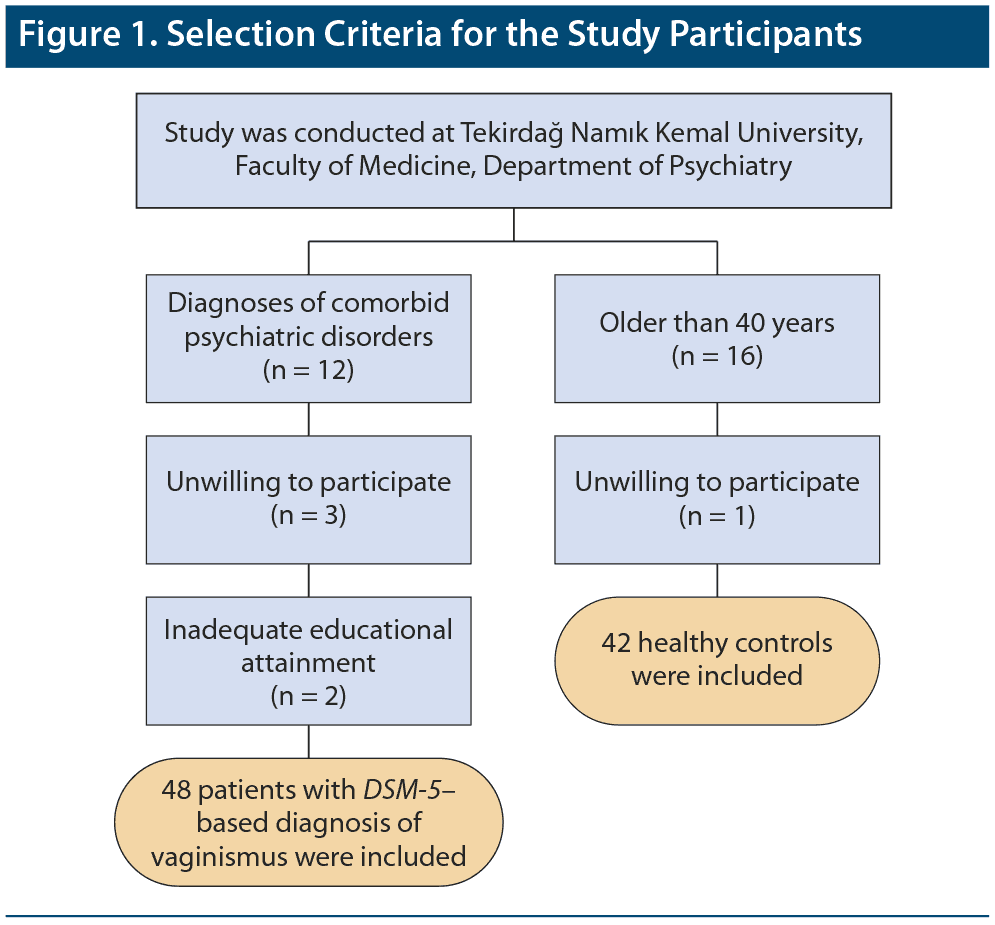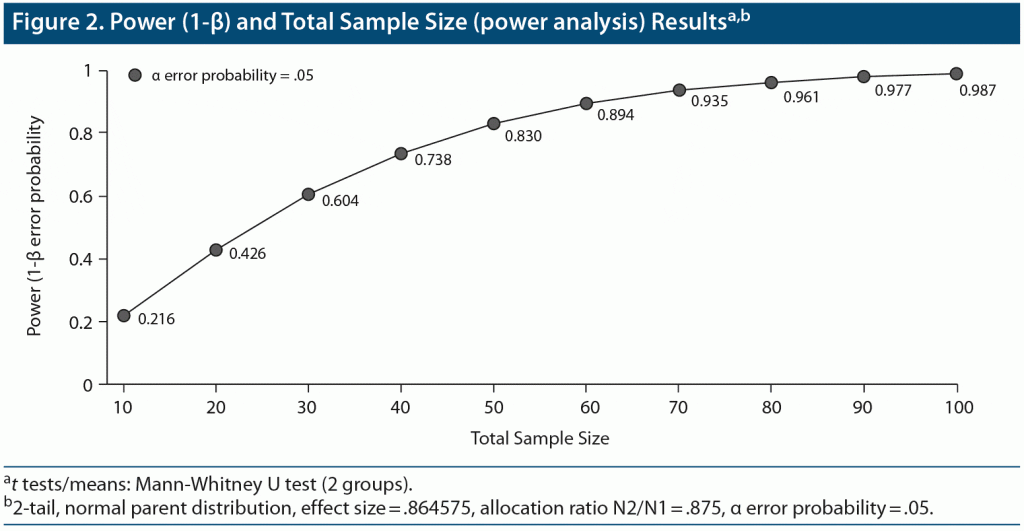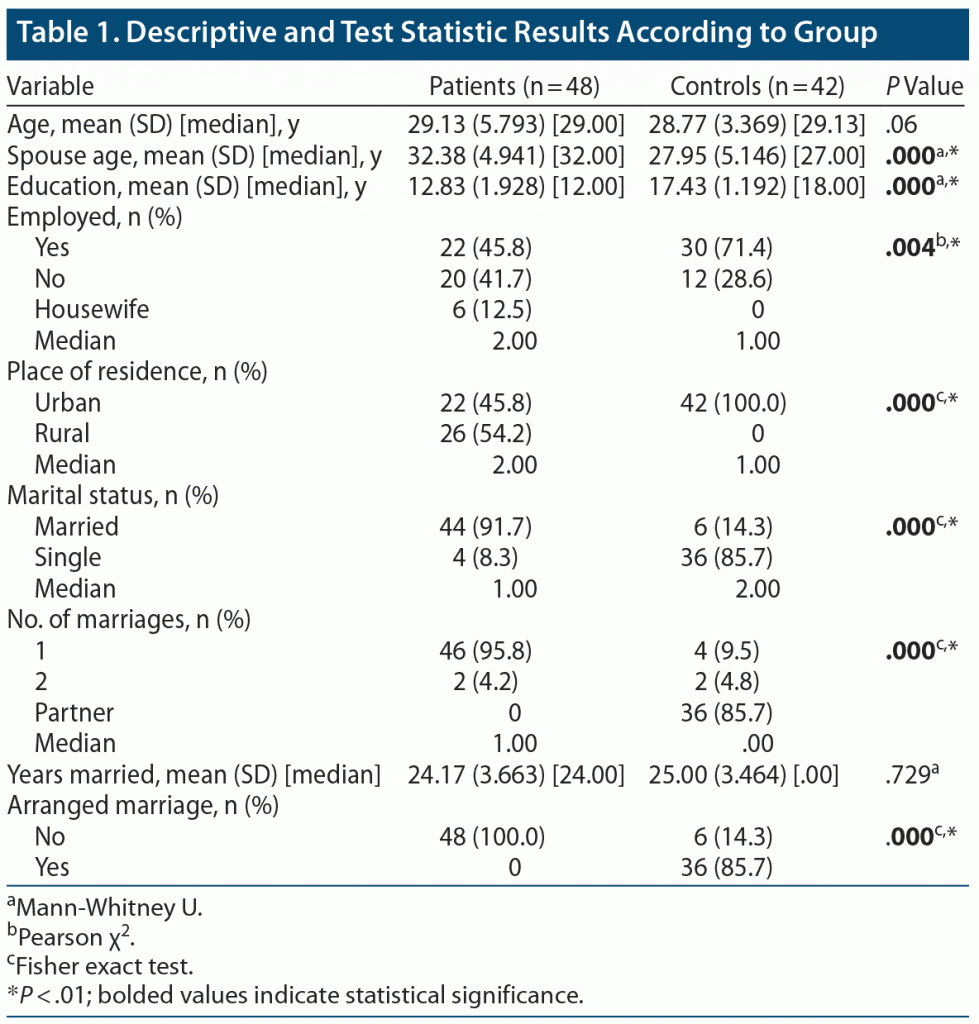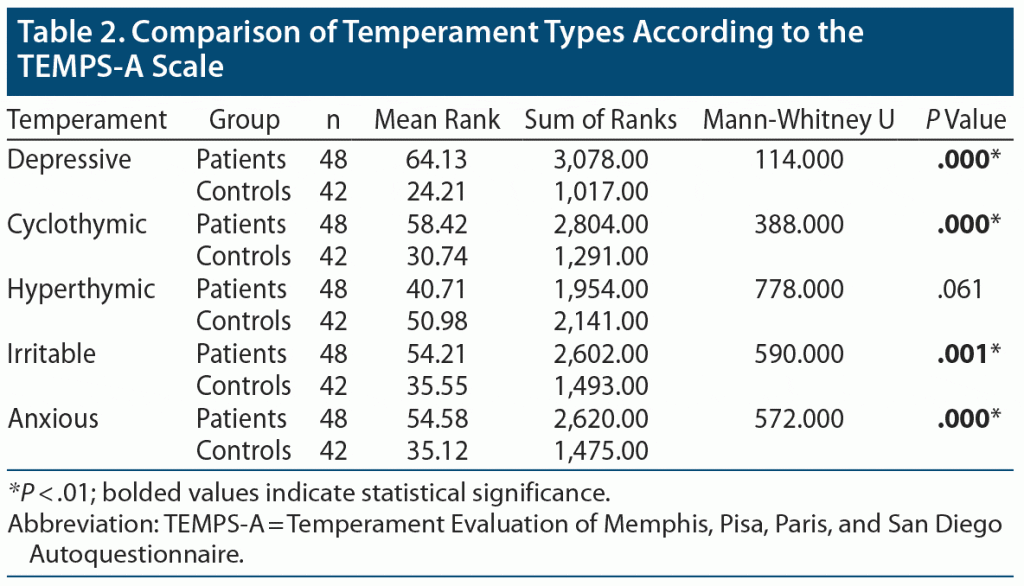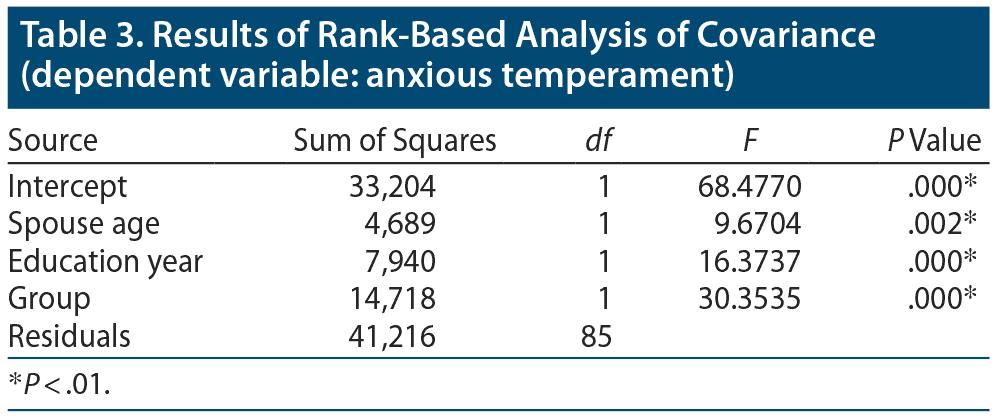ABSTRACT
Objective: Vaginismus is one of the most frequently occurring genito-pelvic pain disorders in women. Sexual dysfunction commonly presents with comorbid psychiatric disorders, and many patients suffering from the former exhibit the latter. The objective of this study was to investigate the affective temperaments of women with vaginismus compared to healthy controls.
Methods: Forty-eight women with vaginismus and 42 age-matched healthy women were recruited and compared in terms of their scores on the Temperament Evaluation of Memphis, Pisa, Paris, and San Diego Autoquestionnaire and a sociodemographic instrument.
Results: Except for the scores for hyperthymic temperament, those for depressive, cyclothymic, irritable, and anxious temperaments were significantly higher in the vaginismus group than in the healthy controls (P<.05). The analysis of covariance indicated that the anxious temperament was significantly associated with covariants.
Conclusions: On the basis of the preliminary results, women with vaginismus may be candidates for bipolar disorder. This population should therefore be screened more carefully in terms of the development of the disorder. Bipolar disorder should also be considered when treatments for comorbid psychiatric disorders are needed.
Prim Care Companion CNS Disord 2021;23(1):20m02705
To cite: Aksu E, Beyazyüz E, Albayrak Y, et al. Altered affective temperaments in women with vaginismus. Prim Care Companion CNS Disord. 2021;23(1):20m02705.
To share: https://doi.org/10.4088/PCC.20m02705
© Copyright 2021 Physicians Postgraduate Press, Inc.
aDepartment of Gynecology and Obstetrics, Rumeli University, Vatan Hospital, Tekirdağ, Turkey
bFaculty of Medicine, Department of Psychiatry, Tekirdağ Namık Kemal University, Tekirdağ, Turkey
cFaculty of Economics and Administrative Science, Department of Healthcare Managment,Ankara Hacıbayram Veli University, Ankara, Turkey
*Corresponding author: Yakup Albayrak, MD, Department of Psychiatry, Tekirdağ Namık Kemal Üniversitesi Tıp Fakültesi 59100, Süleymanpaşa, Tekirdağ ([email protected]).
Vaginismus is a frequently occurring genito-pelvic pain disorder in women. It is described as a penetration disorder in the Diagnostic and Statistical Manual of Mental Disorders, Fifth Edition (DSM-5), and patients with this condition cannot have intercourse because of the excessive pain that accompanies attempts at penetration.1 Patients with vaginismus experience recurrent pelvic pain and anticipation of pelvic pain during vaginal penetration attempts.2 The estimated frequency of vaginismus among women who are admitted to outpatient clinics for sexual dysfunction is about 25% in Western countries,3 but incidence has been reported to be as high as 41% and 75% in Eastern nations.4–6 Sexual dysfunction commonly presents with comorbid psychiatric disorders, and 57% of patients suffering from the former exhibit the latter.7 Among this patient group, the most common psychiatric comorbidities are mood, anxiety, and personality disorders. Psychiatric disorders can complicate the treatment process for sexual dysfunction.7
Affective temperaments are regarded as antecedents of mood disorders,8 which have been considered as part of the affective disorder spectrum on the basis of accumulating evidence. The depressive temperament is associated with depressive disorder, whereas hyperthymic and irritable temperaments are related to bipolar disorder.8 Clinical biological studies have demonstrated that associations between affective temperaments and affective disorders as well as other psychiatric disorders are complex.9 Although studies have investigated comorbid psychiatric disorders in relation to sexual dysfunction, no research has been devoted to affective temperaments in patients with vaginismus. The present study therefore inquired into this issue, guided by the hypothesis that women with vaginismus differ from healthy women with respect to affective temperaments.
METHODS
Participants and Settings
This study was conducted in the Department of Psychiatry of the Faculty of Medicine of Tekirdag Namık Kemal University. The research protocol was approved by the Non-Invasive Clinic Research Ethical Committee of the same university (Tekirdag Namık Kemal University Non-Invasive Clinic Research Ethical Committee; date: May 30, 2019; approval no. 2019.99.06.20). The present study was conducted between January 1, 2020, and March 1, 2020 and was designed as a convenience study.
Patients who were diagnosed as having vaginismus in accordance with DSM-5 criteria were enrolled in the study. The patients were recruited from the Department of Psychiatry of the Faculty of Medicine of Tekirdag Namık Kemal University. The inclusion criteria were as follows: a DSM-5–based diagnosis of vaginismus, no previous or current psychiatric diagnosis, sufficient education to complete the self-assessment tests used in the research, and the willingness to participate in the study. Patients who had been diagnosed with a psychiatric disorder or were at the time of screening suffering from such a condition, those with insufficient education to understand the aim of the study and the scales used, and those who refused to take part in the research were excluded. An initial sample of 65 patients was recruited, but 12 were eliminated from the pool because of diagnoses of comorbid psychiatric disorders, 3 were eliminated after they expressed an unwillingness to participate, and 2 were excluded for inadequate educational attainment. Thus, the final sample comprised 48 patients. An additional 42 age-matched healthy women were recruited on the basis of the following inclusion criteria: aged 18 to 40 years and willing to participate after being given detailed information about the objective of the research. Figure 1 describes the selection criteria. The control group was selected from the female staff of same hospital. All patients and healthy controls completed the Temperament Evaluation of Memphis, Pisa, Paris, and San Diego Autoquestionnaire (TEMPS-A) and a sociodemographic form. This study was performed according to the standards for biomedical research on human subjects according to the Declaration of Helsinki. All study participants provided written informed consent.
Assessment Tools
Sociodemographic form. We created the sociodemographic form, with the literature as reference. The form comprises questions regarding age, spousal age, years of education, occupation, place of residence, marital status, number of marriages, age of entry into marriage, and marital condition.
Temperament Evaluation of Memphis, Pisa, Paris, and San Diego Autoquestionnaire. The TEMPS-A is a scale originally designed by Akiskal et al10 and adapted into Turkish by Vahip et al.11 In the present study, this scale was used to evaluate the scores of the participants with regard to the subdimensions of the instrument, namely, depressive, cyclothymic, hyperthymic, irritable, and anxious temperaments. The TEMPS-A is a self-assessment scale featuring true-or-false statements that ask about the moods and temperaments experienced over the entire life course of an individual.
Statistical Analyses
Statistical analyses were performed using R software version 3.5.3 (The R Foundation, Vienna, Austria), SPSS version 23.0 (IBM, Armonk, New York), and G*Power version 3.1.12 Power analysis eliminates the most important complexity in sampling and was therefore adopted in this work. Descriptive statistics, such as mean values, medians, and percentages, were calculated. The dimensions of the TEMPS-A and distribution in the groups were examined graphically and through the use of Shapiro-Wilks statistics. Pearson c2 test and Fisher exact test were performed to examine differences in categorical variables between the patient and control groups. The Mann-Whitney U test was conducted to assess variances in continuous variables between the groups. This test was conducted for 2 independent samples on the basis of the normality test results. For statistically significant associations, we also investigated which variables contributed to the differences via an analysis of covariance (ANCOVA). We went without a multivariate normality test because none of the data on the TEMPS-A dimensions were normally distributed. Instead, we carried out rank-based ANCOVA under the non-normality assumption. Figure 2 shows that the analysis does not readily enable normality as a single variable. Therefore, the assumption is unlikely to be achieved. To address this matter, we used the rank-based ANCOVA proposed by Kloke and McKean13 (Figure 2).
Power Analysis
The Mann-Whitney U test was performed as a statistical test in the power analysis. The effect size was 0.86, and the 2-sample size ratio was 0.875. These values were used to calculate the power of the test. With n=80, the power of the test is indicated as reaching 96% (Figure 1). The sample size appropriate for the study was thus determined as 90, and the statistical power derived was more than the expected value.
RESULTS
The results showed significant P values. Table 1 presents the results of the Pearson c2 test, which reflected a statistically significant association between occupation and group type. The findings acquired via Fisher exact test indicated statistically significant relationships between the following: place of residence and group type, marital status and group type, number of marriages and group type, and marital condition and group type. According to the Mann-Whitney U test, the vaginismus and control groups differed in terms of spousal age and years of education. The difference was statistically significant.
The depressive, cyclothymic, hyperthymic, irritable, and anxious temperament scores were significantly higher in the vaginismus group compared with the control group (Table 2).
In addition, ANCOVA analysis was performed only for the patient and control groups, who showed statistically significant differences. The variables contributing to TEMPS-A dimensions were statistically significant only with respect to the anxious temperament. Accordingly, as covariates, spousal age and years of education significantly contribute to the differentiation in the anxious temperament scores of the patient and control groups (Table 3). The fixed-factor group variable and the rank-based ANCOVA model were also statistically significant. The model explains 28% of the variance in the anxious temperament scores.
DISCUSSION
We found that the TEMPS-A dimensions of depressive, cyclothymic, irritable, and anxious temperaments were significantly higher in the women with vaginismus than among the healthy women. Although a number of covariants were incorporated into the comparison, the findings revealed that the anxious temperament was associated only with spousal age and years of education. Comorbid psychiatric disorders have been established as accompanying vaginismus.14 An earlier study15 reported that 79.9% of women who have lifetime vaginismus are diagnosed with at least 1 anxiety disorder or major depression comorbidity. The authors15 found that 13% of these women suffer from a mood disorder. Recent research7 demonstrated that at least 1 comorbid anxiety disorder and/or depression are found in 79.86% of patients with vaginismus. The most common comorbidity was phobia (63.9%), followed by major depression (35.4%), social anxiety disorder (13%), panic disorder (10%), obsessive-compulsive disorder (5%), and generalized anxiety disorder (2%).7 However, no conclusive results have been derived specifically with respect to comorbid bipolar disorder and affective temperaments in patients with vaginismus.
Temperaments are stable behavioral tendencies with strong affective reactivity and are linked to the biological background aspects of personality, such as activity levels, rhythms, moods, and cognition, as well as variability in these attributes. Affective temperaments factor importantly in the development of affective disorders.16,17 Akiskal et al16 created the modern concept of affective temperaments to identify all spectra of affective situations, from healthy reactions to major affective disorders. Several clinical studies reported that the depressive temperament is more common among patients with major depressive disorder, whereas hyperthymic and cyclothymic temperaments are specific to bipolar disorder.18 Nevertheless, the associations between affective temperaments and other psychiatric disorders are complex.
Dolenc et al19 evaluated patients with euthymia in terms of affective temperaments and found that affective temperaments can be assessed in 2 subclasses: the first is characterized by high depressive, irritable, anxious, and cyclothymic incidences, which can cause emotional instability, and the second is characterized by protuberant emotional and mood intensities (hyperthymic profile). In the present study, the higher scores of the vaginismus patients in the depressive, cyclothymic, irritable, and anxious dimensions suggest that women with vaginismus tend to be emotionally unstable. Such scores also led us to conclude that women with vaginismus may be candidates for bipolar disorder. Furthermore, even when the covariants could have confounded the assessment of affective temperaments, we found that only the anxious temperament was associated with these covariants and that depressive, cyclothymic, and irritable temperaments remained significantly higher in the vaginismus group. We suggest that our results also highlight an important issue in daily clinical settings. Our preliminary results indicate that women with vaginismus tend to develop mood disorders more than women without vaginismus. Regarding the importance of diagnosing some mood disorders from the patient’s history and retrospectively,20 clinicians should be aware of mood disorder symptoms during the assessment of women with vaginismus.
Only 2 studies have investigated personality traits in women with vaginismus. One study21 reported that women with vaginismus had significantly higher histrionic-hysterical symptoms and traits compared with subjects with other sexual complaints. Konkan and colleagues22 reported that statistically significant higher scores were found in the vaginismus group compared with the control group only for emotionality item scores of the reward dependence subscale.
The present study has several limitations. First, although we performed a power analysis, the sample size can be considered insufficient for drawing general conclusions. Second, the vaginismus and control groups differed in terms of urban/rural similarity and educational status, which may account for some of the differences in temperaments. Finally, the single-site nature of the study can be considered a limitation.
In conclusion, we suggest that women with vaginismus are susceptible to developing bipolar disorder on the basis of our preliminary results. This population should thus be screened more carefully in terms of disease development, and bipolar disorder should be kept in mind when treatment of comorbid psychiatric disorders is warranted.
Submitted: May 31, 2020; accepted July 24, 2020.
Published online: February 18, 2021.
Potential conflicts of interest: None.
Funding/support: None.
CLINICAL POINTS
- Vaginismus is a common genito-pelvic pain disorder in women.
- Comorbid mood disorders are insufficiently investigated in vaginismus.
- Women with vaginismus demonstrate distinct temperaments.
- Women with vaginismus are susceptible to developing bipolar disorder.
References (22)

- American Psychiatric Association. Diagnostic and Statistical Manual for Mental Disorders. Fifth Edition. Washington, DC: American Psychiatric Association; 2013.
- Simonelli C, Eleuteri S, Petruccelli F, et al. Female sexual pain disorders: dyspareunia and vaginismus. Curr Opin Psychiatry. 2014;27(6):406–412 PubMed CrossRef NLM
- Nobre PJ, Pinto-Gouveia J, Gomes FA. Prevalence and comorbidity of sexual dysfunctions in a Portuguese clinical sample. J Sex Marital Ther. 2006;32(2):173–182 PubMed CrossRef NLM
- Dogan S. Vaginismus and accompanying sexual dysfunctions in a Turkish clinical sample. J Sex Med. 2009;6(1):184–192. PubMed CrossRef NLM
- Raisi F, Ghassemzadeh H, Meysami A, et al. Sexual dysfunction in obsessive-compulsive disorder. Tehran University Medical Journal. 2015;72(2):101–109.
- Tuğrul C, Kabakci E. Vaginismus and its correlates. Sex Marital Ther. 1997;12(1):23–34. CrossRef
- Yıldırım EA, Hacıoğlu Yıldırım M, Karaş H. Prevalence of depression and anxiety disorders and their relationship with sexual functions in women diagnosed with lifelong vaginismus [in Turkish]. Turk Psikiyatr Derg. 2019;30(1):9–15. PubMed NLM
- Rihmer Z, Akiskal KK, Rihmer A, et al. Current research on affective temperaments. Curr Opin Psychiatry. 2010;23(1):12–18. PubMed CrossRef NLM
- Innamorati M, Rihmer Z, Akiskal H, et al. Cyclothymic temperament rather than polarity is associated with hopelessness and suicidality in hospitalized patients with mood disorders. J Affect Disord. 2015;170:161–165. PubMed CrossRef NLM
- Akiskal HS, Akiskal KK, Haykal RF, et al. TEMPS-A: progress towards validation of a self-rated clinical version of the Temperament Evaluation of the Memphis, Pisa, Paris, and San Diego Autoquestionnaire. J Affect Disord. 2005;85(1–2):3–16. PubMed CrossRef NLM
- Vahip S, Kesebir S, Alkan M, et al. Affective temperaments in clinically-well subjects in Turkey: initial psychometric data on the TEMPS-A. J Affect Disord. 2005;85(1-2):113–125. PubMed CrossRef NLM
- Faul F, Erdfelder E, Lang AG, et al. G*Power 3: a flexible statistical power analysis program for the social, behavioral, and biomedical sciences. Behav Res Methods. 2007;39(2):175–191. PubMed CrossRef NLM
- Kloke JD, McKean JW. Rfit: Rank-based estimation for linear models. R J. 2012;4(2):57–64. CrossRef
- Rahman S. Female sexual dysfunction among Muslim women: increasing awareness to improve overall evaluation and treatment. Sex Med Rev. 2018;6(4):535–547. PubMed CrossRef NLM
- Derogatis LR, Meyer JK, King KM. Psychopathology in individuals with sexual dysfunction. Am J Psychiatry. 1981;138(6):757–763. PubMed CrossRef NLM
- Akiskal KK, Akiskal HS. The theoretical underpinnings of affective temperaments: implications for evolutionary foundations of bipolar disorder and human nature. J Affect Disord. 2005;85(1-2):231–239. PubMed CrossRef NLM
- Kelsoe JR. Arguments for the genetic basis of the bipolar spectrum. J Affect Disord. 2003;73(1–2):183–197. PubMed CrossRef NLM
- Gassab L, Mechri A, Bacha M, et al. Affective temperaments in the bipolar and unipolar disorders: distinctive profiles and relationship with clinical features [in French]. Encephale. 2008;34(5):477–482. PubMed CrossRef NLM
- Dolenc B, Dernovšek MZ, Sprah L, et al. Relationship between affective temperaments and aggression in euthymic patients with bipolar mood disorder and major depressive disorder. J Affect Disord. 2015;174:13–18. PubMed CrossRef NLM
- Faedda GL, Serra G, Marangoni C, et al. Clinical risk factors for bipolar disorders: a systematic review of prospective studies. J Affect Disord. 2014;168:314–321. PubMed CrossRef NLM
- Maseroli E, Scavello I, Cipriani S, et al. Psychobiological correlates of vaginismus: an exploratory analysis. J Sex Med. 2017;14(11):1392–1402. PubMed CrossRef NLM
- Konkan R, Mayrak M, Gönüllü GO, et al. Sexual function and satisfaction of women with vaginismus. J Psychiatry Neurol Sci. 2012;25:305–311.
Enjoy this premium PDF as part of your membership benefits!
